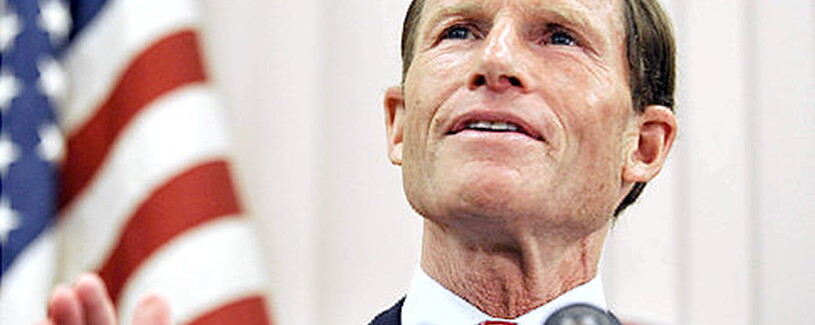Senator Blumenthal Shares Thoughts on Climate Change

by Emily Greenlee
On the evening of March 27, the Yale School of Forestry & Environmental Studies, in conjunction with the Sierra Club, hosted Senator Richard Blumenthal (CT- D) for a panel discussion surrounding climate change, public opinion, and policy. Anthony Leiserowitz (Yale Project on Climate Change Communications) and Nadine Unger (Assistant Professor of Atmospheric Chemistry) joined Senator Blumenthal for the conversation, which was moderated by F&ES Associate Dean David Skelly.
youtube=http://www.youtube.com/watch?v=e6xZPeNoHEY&feature=youtu.be
Senator Blumenthal started the evening with a powerful assertion that “our world is changing” as evidenced by recent climactic events seen here in Connecticut, from Superstorm Sandy to Winter Storm Nemo. The Senator believes that we have a political window of opportunity, as well as a scientific and natural window of opportunity, to deal with climate change now. According to Blumenthal, this political window of opportunity is made possible by the Obama Presidency, the Democratic majority in the Senate, and the fact that the majority of the American people “get it.”
In fact, according to Dr. Leiserowitz, the Yale Project on Climate Change Communications has found that Americans are increasingly drawing the connection between frequent extreme weather events and global climate change. These extreme events may be the best hope to make Americans aware of the impacts of climate change on their lives.
According to Dr. Unger, the global warming signal is currently 0.7 degrees Celsius attributed to human activity, but the weather fluctuations we experience in our daily lives are five to ten times larger. Dr. Unger worries that if we wait for the global warming signal to be large enough to feel, we will be living in a completely different planet from the one we live in now, with no ice in the Himalayas or agriculture in the American breadbasket. Leiserowitz’s research indicates, however, that even with a dearth of political and media attention to climate change over the past few years, extreme events have caused a surge in public concern about climate change, with upwards of 70% of Americans believing that such events are worsening. Senator Blumenthal cautioned that, as he has seen in his two years in the Senate, the will of the majority can be stymied by a minority. If we can organize and galvanize public opinion, however, the quiet majority that is concerned about climate change will prevail.
Senator Blumenthal argued that one important ingredient in finding the political will to address climate change will be convincing the American public that “economic growth and jobs are not in conflict with environmental values.” He has found that in the current economic climate, his constituents are concerned about jobs and the economy above all else.
The panelists disagreed on whether hydraulic fracturing for natural gas is an example of the kind of economic and environmental win-win that appeals to the electorate and to environmentalists. The Senator stated that while fracking presents potential perils, which necessitate safeguards, the potential for more natural gas is a real opportunity. Dr. Unger, on the other hand, posited that the latest climate science shows natural gas to be no better than coal from a climate change perspective, because of methane leakage. Unger believes a more extensive measuring campaign is necessary before we can say anything more definitive about natural gas in the United States. Finally, Dr. Leiserowitz argued that the jury is still out on some of the science around natural gas, with many questions remaining about the lifecycle impacts of gas. On the plus side, fracking is a domestic source of energy and could allay some of energy-related security threats; on the minus side, fracking has allowed natural gas to outcompete renewables.
In closing, Senator Blumenthal offered some thoughts on his vision for the way forward on climate change. He urged the F&ES community and other audience members to help to organize and galvanize the “silent majority” of Americans who care about climate change around economically beneficial environmental changes: building retrofits, renewable energy development, and a “polluter pays” carbon policy. As Dr. Leiserowitz said, an organized electorate could “strengthen the spines of our elected officials,” like Senator Blumenthal, as they fight for climate change legislation in the halls of Congress.
Emily Greenlee is a first year MEM candidate with a background in domestic environmental advocacy and an interest in economics and policy issues influencing clean energy supply. Before starting at F&ES this fall, Emily spent three years as a Litigation Assistant in the New York City office of Earthjustice, a non-profit environmental law firm.